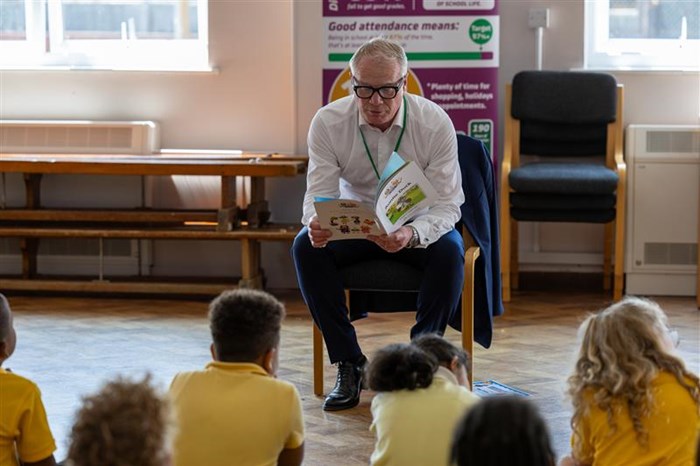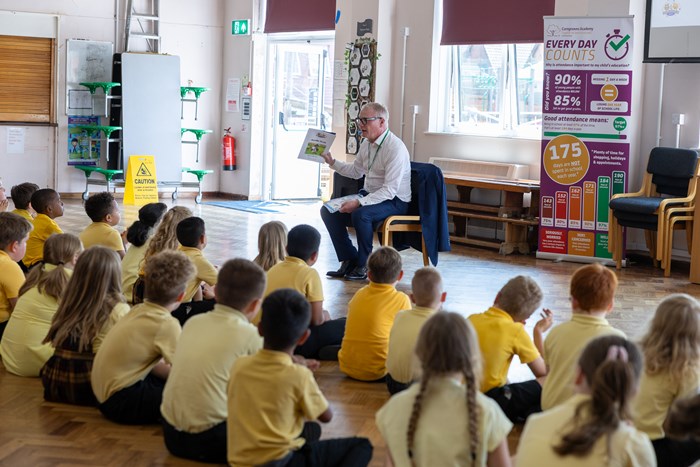Children to breathe easier as schools help tackle pollution on Clean Air Day
Published: Thursday 19 Jun 2025
West Midlands Mayor Richard Parker went back to school today to announce a new education programme that will help thousands more schoolchildren improve the air quality where they live.
The Mayor visited Corngreaves Academy in Cradley Heath on Clean Air Day to speak to a class of seven, eight and nine-year-olds about air pollution, how it affects them and what they can do to limit their exposure.

Mayor of the West Midlands Richard Parker reads ‘Auntie Duck’ to pupils at Corngreaves Academy
The new schools’ programme will provide every school in the West Midlands with specially written lessons and assembly plans, hands-on classroom activities and workshops that link into the National Curriculum.
Primary schools will also be able to get free copies of Auntie Duck - an air quality-themed children’s storybook written by The Dog, Duck and Cat Charitable Trust with advice from Sandwell Council's air quality experts.
The book helps children understand air pollution in a simple and fun way as it follows the story of Auntie Duck as she arrives from abroad to visit her nephew, Duck. Along the way she shares her experience of flying through poor quality air.
The West Midlands Combined Authority (WMCA) has already worked with 10 schools to pilot the education programme.
Resources will now be made available to all schools over the coming year as part of a wide-ranging plan by the Mayor and the WMCA to improve air quality and the health of local people.
The Mayor said: “Being able to breathe clean air shouldn’t be seen as a privilege – it’s a right. And one that everyone in the West Midlands deserves.
“The air we breathe matters to our health. And we can all make choices right now to improve our air quality. The sooner we can make those choices, the better our health which is why it was so important to speak to these children today.
“Our education programme is being piloted in 10 schools across the region. That’s hundreds of children who can start living a healthier life right now.
“But we aren’t stopping there. We’ve recently installed a cross-regional monitoring network so that we can track air quality in real time. Using this data, and taking action, we can help everyone in the West Midlands live longer, healthier lives.”

Mayor of the West Midlands Richard Parker reads ‘Auntie Duck’ to pupils at Corngreaves Academy
Jo Robinson, head of school at Corngreaves Academy, said: “We were extremely honoured to have the Mayor at our school to celebrate Clean Air Day. This was a wonderful opportunity to educate our children about the importance of environmental responsibility.
“We were particularly excited for the Mayor to read Auntie Duck, which has certainly captivated and inspired our young learners. We were also thrilled that two of our children gained 1st and 2nd place in the Auntie Duck poster competition.”
Cllr Jackie Taylor, Sandwell Council’s cabinet member for adult services, health and wellbeing, said: “Auntie Duck is a great and innovative way to explain the importance of air pollution to Sandwell’s children and through them their parents and guardians as well. I hope this initiative helps to highlight this important issue.”
There are more than 2,300 premature deaths every year in the region due to long-term health conditions such as asthma, coronary heart disease, stroke, and lung cancer that are made worse by air pollution.
The WMCA’s region-wide Air Quality Framework set out measures that could be implemented in partnership with local authorities, central government, businesses and local communities to accelerate improvements to air quality on a regional scale.
Since then, the largest network of air quality sensors outside London has been installed by the WMCA around homes, schools, businesses, hospitals and sports centres.
Local people can see the data online at cleanair.wmca.org.uk, and get a greater insight into pollution hotspots, allowing them to take steps to protect their health and improve the environment.
Later this year, residents will be able to sign up for free alerts directly to their mobile phones when pollution levels in their neighbourhoods reach high limits.
The WMCA is also transforming the public transport network, with more cycle lanes, electric vehicle chargers and zero-emissions buses. As well as upgrading homes and businesses to make them more energy efficient.
Find out more about the WMCA’s work to improve air quality at www.wmca.org.uk/what-we-do/environment-energy/air-quality/.
Further enquiries
For all other enquiries from members of the public go to our contact us page: https://www.wmca.org.uk/contact-us/